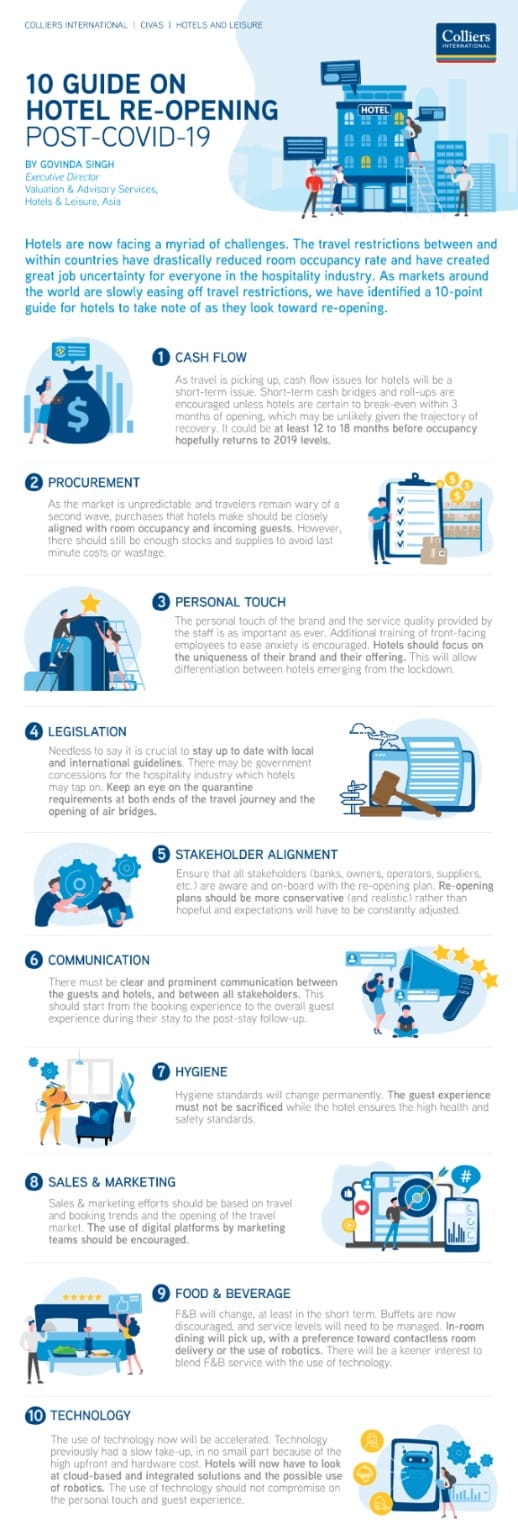As markets around the world are slowly easing off travel restrictions, these are 10 key points for hotels to take note of as they look toward re-opening.
Hotels are now facing a myriad of challenges. The travel restrictions between and within countries due to the coronavirus (COVID-19) pandemic have drastically reduced room occupancy rates and have created great job uncertainty for everyone in the hospitality industry.
But as markets around the world now slowly ease off travel restrictions, hotel owners and operators will also have new challenges to overcome, to ensure their hotels are ready to re-open post-pandemic.
We have outlined a 10-point guide for hotels to take note of as they look toward re-opening and rolling out the red carpet to welcome guests back.
#1 Cash flow
As travel is picking up, cash flow issues for hotels will be a short-term issue. Short-term cash bridges and roll-ups are encouraged unless hotels are certain they would break-even within 3 months of opening, although this may be unlikely given the trajectory of recovery. It could be at least 12 to 18 months before occupancy hopefully returns to 2019 levels.
#2 Procurement
With the market being unpredictable and travelers remaining of a second wave of the pandemic, purchases that hotels make should be closely aligned with room occupancy and incoming guests. However, there should still be enough stocks and supplies to avoid last minute costs or wastage.
#3 Personal Touch
The personal touch of the hotel brand and the service quality provided by the staff are as important as ever. To ease anxiety of both the staff and guests, additional training of front-facing employees is encouraged.
With hotels reopening simultaneously, a focus should be on the uniqueness of the hotel brand and their offering, to allow differentiation between hotels emerging from the lockdown.
#4 Legislation
Needless to say, it is crucial to stay up to date with local and international guidelines.
There may be government concessions for the hospitality industry which hotels may tap on. Keep an eye on the quarantine requirements at both ends of the travel journey and the opening of air bridges, to ensure adherence as well as the guest's seamless experience.
#5 Stakeholder Alignment
Ensure that all stakeholders - such as banks, owners, operators and suppliers - are aware of, and on-board with, the re-opening plan. As hotels gear up to welcome their guests back, re-opening plans should be more conservative (and realistic) rather than hopeful and expectations will have to be constantly adjusted.
#6 Communication
There must be clear and prominent communication of guidelines and new processes in place between the guests and hotel, and between all stakeholders, to alleviate any misunderstandings or non-adherence. Clear communications should start from the guests' booking experience, the overall guest experience during their stay, to the point of check-out, when hotels can do a post-stay follow-up.
#7 Hygiene
Hygiene standards will no doubt change, permanently. That said, the guest experience must not be sacrificed while the hotel ensures the high health and safety standards.
#8 Sales and Marketing
Sales and marketing efforts should be based on travel and booking trends, as well as the opening of the travel market. Marketing teams should be quick to adapt to the changes and new trends, and embrace the use of digital platforms for both sales and marketing efforts.
#9 Food and Beverage (F&B)
F&B will also change - at least in the short term.
Buffets are now discouraged; guests' expectations and hotel service levels will need to be managed accordingly. In-room dining will pick up, with a preference toward contactless room delivery or the use of robotics. There will be a keener interest to blend F&B service with the use of technology.
#10 Technology
The use of technology in hotels and throughout the guest experience will now be accelerated. Technology previously had a slow take-up, largely due to the high upfront and hardware costs involved. Hotels will now have to look at cloud-based and integrated solutions and the possible use of robotics, for internal and external operations.
With that said, keep in mind that the use of technology should not compromise on the personal touch and guest experience.
A 10-point guide for hotels on re-opening post-Covid-19 (click to enlarge)
This article is an extract from a webinar: 'What to expect from the hotel industry and how to map out the road to recovery' hosted by BCLP on June 18, 2020. View the webinar here.
You may also like:
Your winning move: Singapore hotels 3 burning real estate questions answered: Hotels & Leisure Disruptors in the hotel industry
Liked what you read? Subscribe to our mailing list for more thought-pieces on the latest in commercial real estate.
---
Article enquiries
Contact our Colliers Editorial team here.



